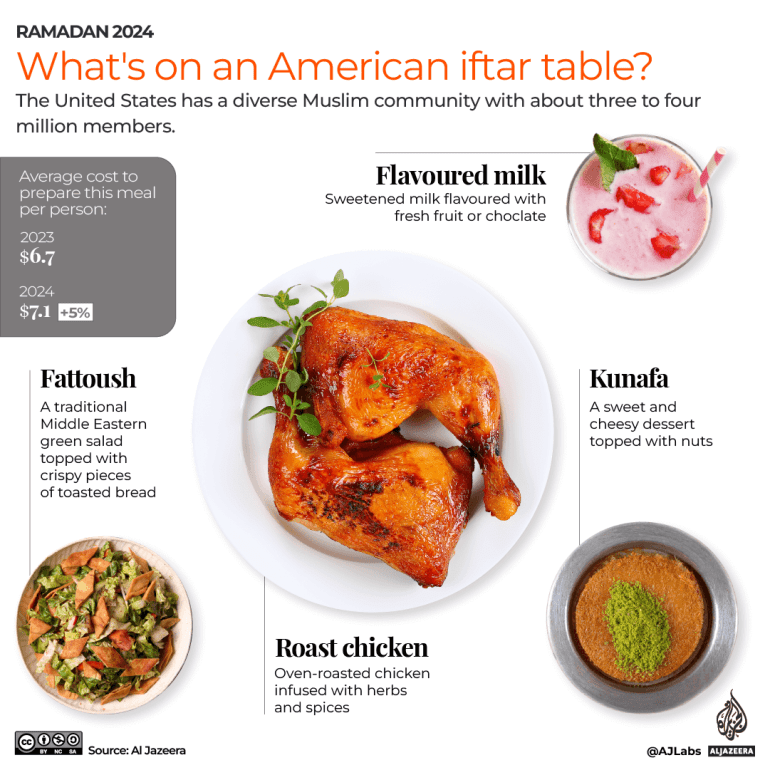The cost of a Ramadan iftar meal around the world
As the sun sets during the Islamic holy month of Ramadan, Muslims from around the world gather to break their fast with dates and water followed by a meal known as iftar.
There are some 1.9 billion Muslims around the world, approximately 25 percent of the global population. For many however, rising food prices have meant that households have had to consider cutting back on some of their favourite Ramadan dishes.
To see just how much the prices of various ingredients have increased over the past year, Al Jazeera compared the prices of dozens of ingredients from a variety of supermarket chains from 14 countries around the world. Below are pictures of these traditional meals along with their corresponding prices, listed alphabetically.
Argentina
From South America, we have a locally inspired main dish with beef asado, featuring various cuts of grilled meat with chimichurri - a tangy parsley dipping sauce.
As a side, we have empanadas, a popular savoury pastry consisting of ground beef or vegetables, and for dessert, dulce de leche pancakes with a sweet and creamy caramel sauce, topped with fresh fruit.
To drink, Argentinians will often enjoy a traditional herbal tea made from the yerba mate plant.
Argentina has experienced one of the world’s highest levels of inflation, with the cost of food increasing 303 percent in February 2024 compared with February of the previous year.
To prepare this particular iftar meal, Al Jazeera calculated that a single serving would cost about 7,200 pesos ($8.4) today, compared with about 1,782 pesos ($2) in 2023, reflecting an increase of more than four times.
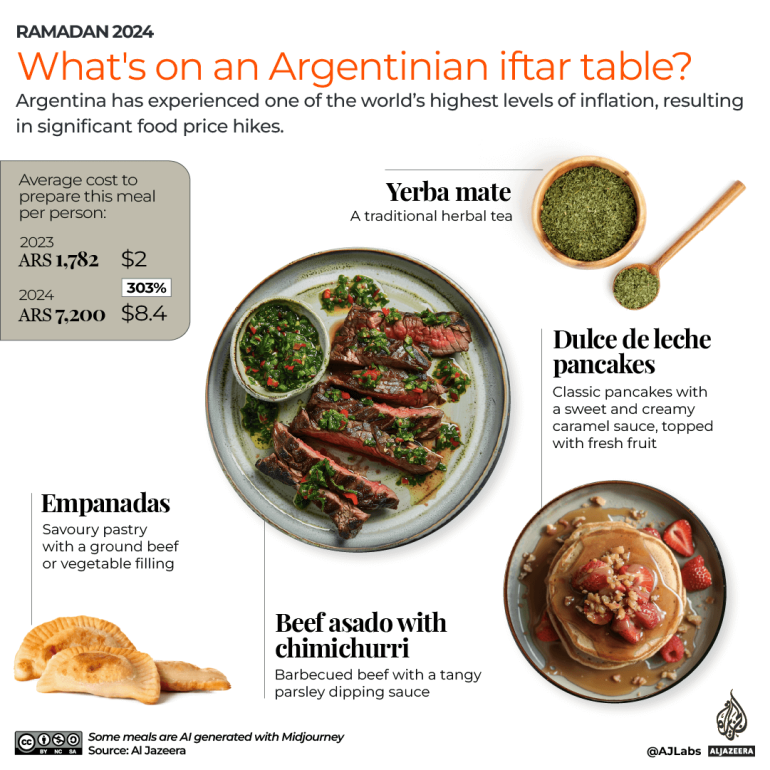
Australia
For the world’s largest island, Australia’s iftar experience is a reflection of the country’s multicultural landscape, blending flavours from across the globe.
At the heart of the meal is a "halal snack pack", a popular street food turned staple dish of shaved lamb over a bed of hot chips and topped with garlic and barbeque sauce.
For the side, a hearty lentil soup with vegetables is often enjoyed and for those with a sweet tooth, there are lamingtons - sponge cake coated in chocolate, filled with jam and blanketed with desiccated coconut.
Best served chilled, cordial is a sweet and refreshing fruit concentrate to rehydrate after a summer day of fasting.
Similar to other Western countries, Australia has also struggled to curb inflation. Al Jazeera calculated that it costs about 12.5 Australian dollars ($8.1) to have this meal in 2024, up from about 11 Australian dollars ($7) the year before.
The biggest price increases came from key ingredients including meat and eggs.
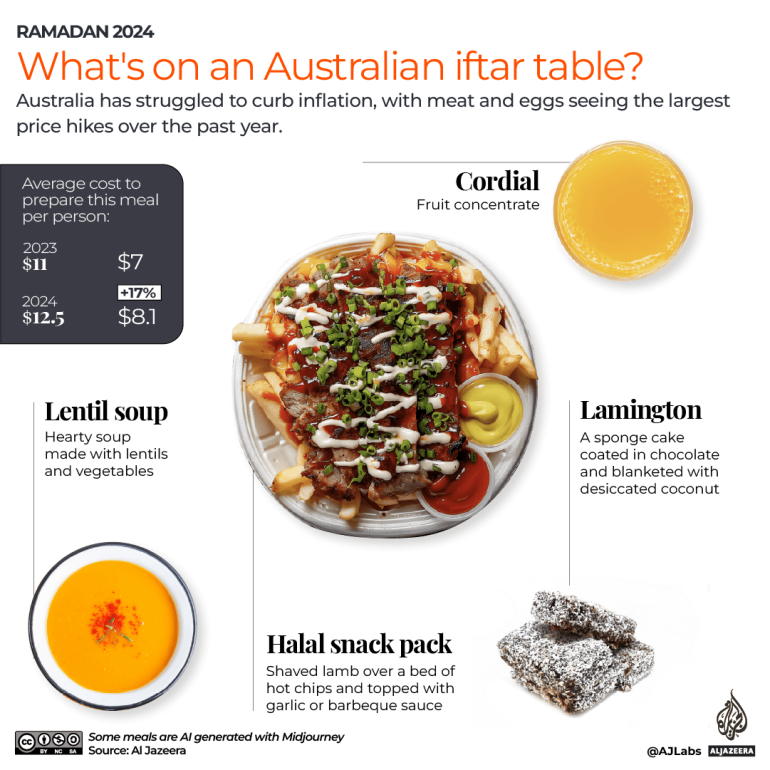
Bosnia and Herzegovina
Among the highest Muslim populations in Europe, Bosnia and Herzegovina has a variety of traditional foods reflecting its multicultural heritage. A solid choice on a Bosnian iftar table is pita krompiruša, a baked dish consisting of layers of thin phyllo dough filled with a savoury mixture of mashed potatoes, onions and spices.
Following the hearty start, the meal transitions to topa, a slow-cooked side of melted cheese and butter. The transition to sweetness is marked by hurmašica, a syrup-soaked dessert that is both sweet and comforting.
Concluding the iftar is a glass of sok od drenjina, a popular beverage made from the fruit of the Cornelian cherry tree.
Combining all meals, Al Jazeera calculated that it costs about 2.9 BAM ($1.6) for a single serving of this meal this Ramadan. In 2023 the same meal cost 2.7 BAM ($1.5), a 7 percent increase.
The higher cost of potatoes, sugar and butter was mainly responsible for a more expensive Bosnian iftar meal in 2024.
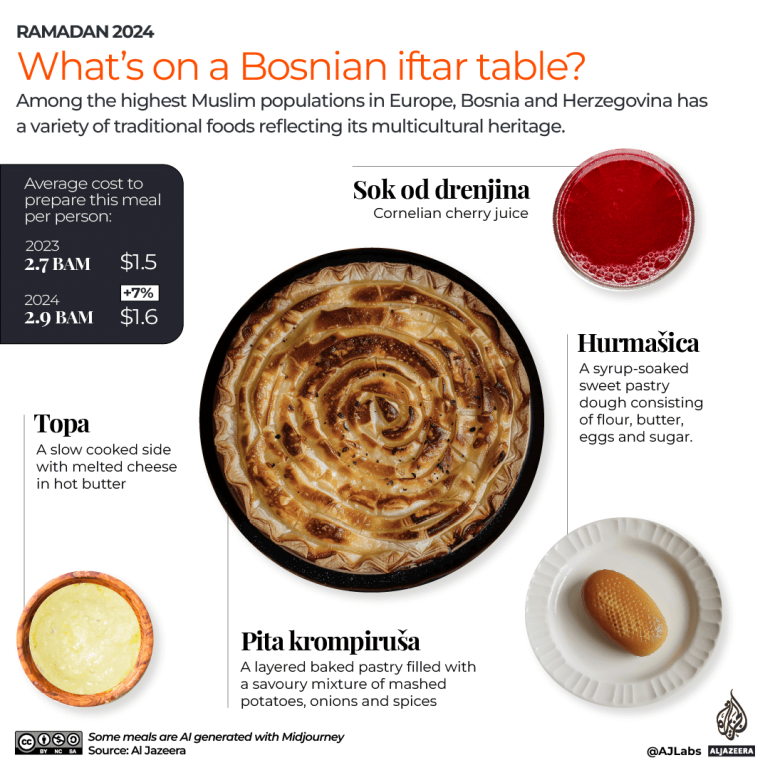
Egypt
A country steeped in centuries-old traditions and culinary heritage, an Egyptian iftar table may include a local delicacy of grape leaves stuffed with a mixture of rice, minced meat and spices.
For a nutritious and comforting soup, chopped molokhiya (jute leaves) prepared with garlic and coriander is always a good choice, followed by kunafa, a sweet and cheesy dessert staple eaten across the Middle East and North Africa.
To quench one’s thirst, qamar al-din, a traditional apricot drink, is a crowd favourite.
Egypt is currently experiencing record levels of inflation and a depreciating currency. This has meant that the prices of many ingredients, most notably ghee and sugar, are nearly three times more expensive than they were last Ramadan.
Al Jazeera calculated that this Ramadan, it will cost roughly 68 Egyptian pounds ($1.4) to prepare a single serving of the meal above. In 2023, the same meal cost 39 Egyptian pounds ($0.8), an increase of 74 percent.
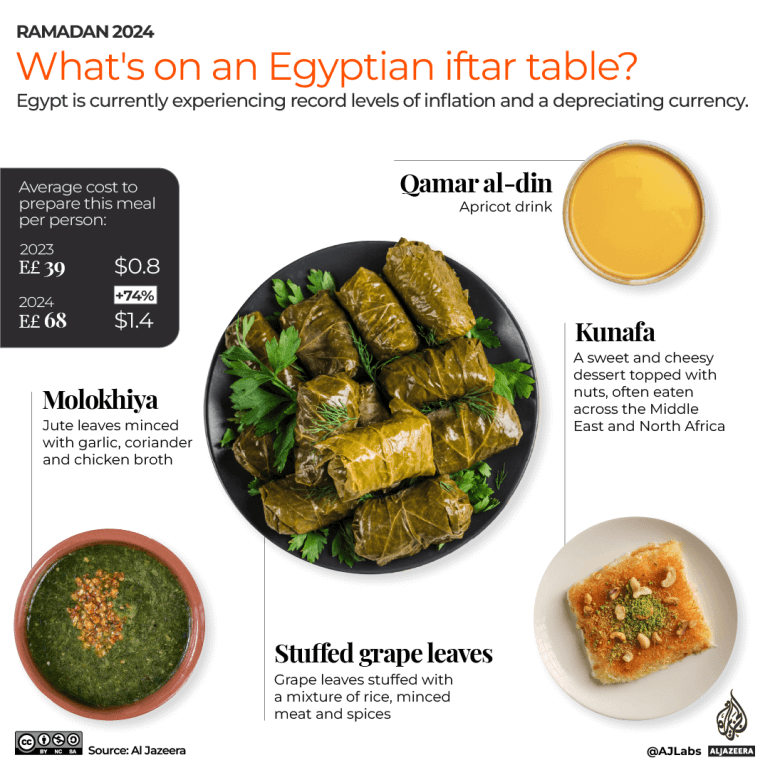
India
India has a great variety of iftar meals to choose from. Among one of the favourites is ghugni, a vegetarian curry made of peas or chickpeas and cooked with onions, tomatoes and various spices.
For sides, there's pakora, a deep-fried vegetable fritter made with onions and green chillies. For dessert, we have suji halwa, a semolina pudding cooked with ghee and sugar and topped with nuts.
To cleanse the palate, one can reach for a glass of refreshing rose drink made from rose syrup, water and often a splash of lime or mint.
In combining these ingredients, Al Jazeera calculated that it costs roughly 149 rupees ($1.8) to prepare a serving of this meal this Ramadan. The same meal last year actually cost 162 rupees ($1.9), a decrease of 9 percent.
The main reason for this was the drop in the price of onions which were used widely in this dish. The price of all other other ingredients either increased or stayed the same.
India is the world’s largest exporter of onions. In December, the country imposed a ban on all onion exports to increase domestic availability and drive down prices which have more than halved since the ban took effect. On March 23, the ban, which was due to expire on March 31, was extended indefinitely.
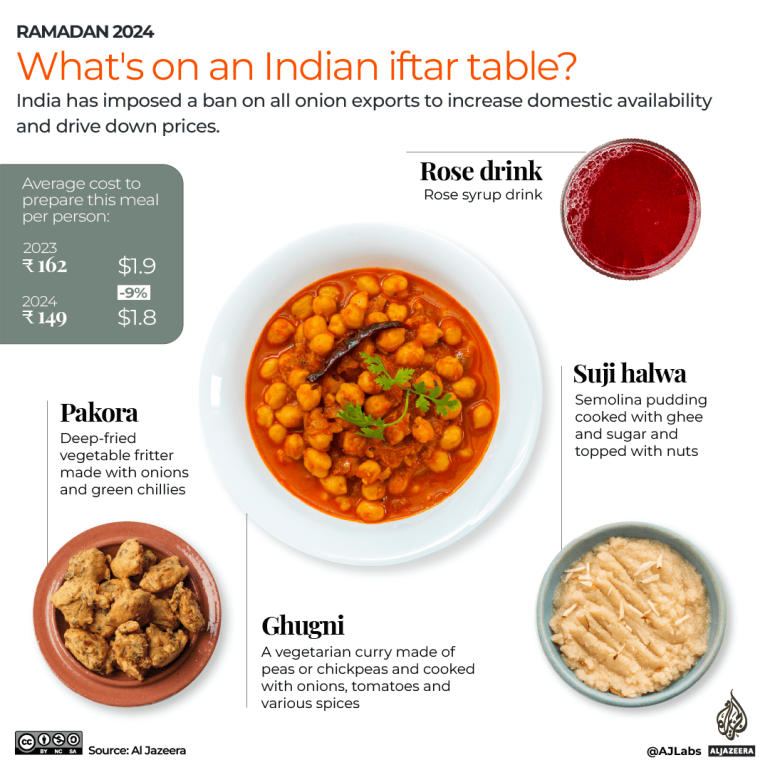
Indonesia
In the world’s largest Muslim nation, spanning six thousand inhabited islands, Indonesia’s iftar traditions are locally inspired by the unique flavour of bubur - a traditional rice porridge topped with shredded chicken, peanuts, greens and an array of spices.
A favourite side dish is, bakwan, a crispy vegetable fritter containing a variety of vegetables such as shredded carrots, cabbage and bean sprouts. For those with a sweet tooth, there is kolak pisang, a sweet dessert made with bananas cooked in coconut milk, sugar and pandan leaves.
And to wrap up the flavourful meal, wash it down with a glass of es timun suri, a refreshing melon and coconut-infused drink.
To prepare the meal, Al Jazeera calculated that it costs about 66,600 rupiah ($4.2) for a serving this year. The cost last year was 62,600 rupiah ($3.9), about 6 percent lower.

Malaysia
A predominantly Muslim nation, Malaysian cuisine is locally inspired with beef rendang, a rich and spicy coconut milk-based beef dish.
As a side, Malaysians often enjoy sayur lodeh, a fragrant vegetable stew made of coconut milk, with eggplant, beans and nuts.
To complement the rich flavours, many Malaysians will reach for a glass of sirap bandung, a sweet rose syrup-infused milk.
And to top things off, a popular dessert is seri muka, a two-layered rice and pandan custard.
Combining all the necessary ingredients, Al Jazeera calculated that it costs roughly 6.9 ringgits ($1.5) to prepare a single serving of this meal in 2024. In 2023 the same meal cost about 6.4 ringgits ($1.3), an increase of 7 percent.
For Malaysia’s iftar, the largest price increases over the past year were in fresh food items, including eggs and coconut milk.
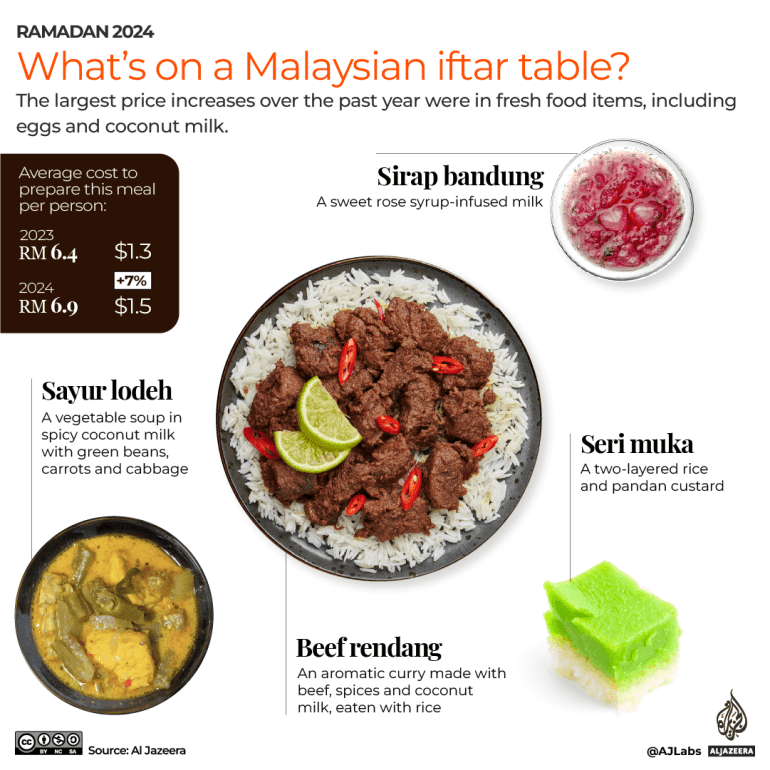
Nigeria
Nigerian cuisine is known for its diverse ingredients and vibrant spices. For the main course, Nigerians, like many across West Africa, will often enjoy jollof rice, a red aromatic rice, served with chicken.
To enhance the flavours, one could enjoy moi moi - a savoury pudding made from black-eyed peas or beans.
And for dessert, a good choice is a fresh fruit salad.
To top things off, a Nigerian iftar is best served with zobo, a popular beverage made from dried hibiscus flowers.
Africa’s most populous nation has seen a worsening inflation rate, aggressively increasing the price of poultry and other fresh food items.
Al Jazeera calculated that in 2024 it costs about 6,500 naira ($4.4) to prepare a serving of this meal, compared with about 3,860 naira ($2.6) the year before - an increase of about 68 percent.
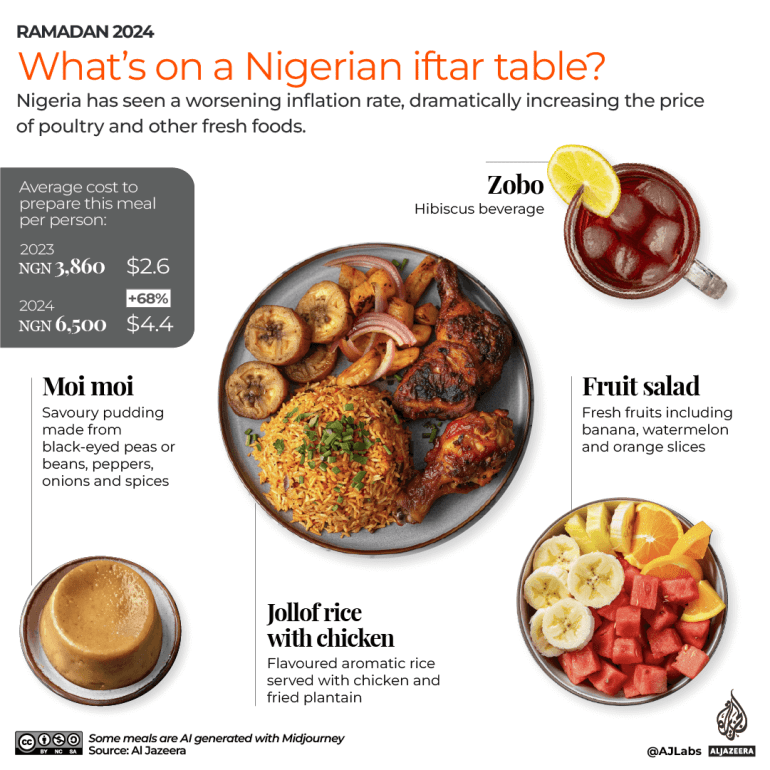
Pakistan
Nearing Iftar time in Pakistan, the atmosphere is imbued with anticipation and warmth starting with dahi baray - lentil fritters, doused in yoghurt and topped with sweet and spicy chutneys.
On the side, we have fruit chaat, a sweet and savoury fruit salad sprinkled with chaat masala. For dessert is jalebi - a popular street food made with flour and sugar with a gooey centre.
A beautiful round-off for iftar is a rose-flavoured drink.
Totalling up the grocery cost, Al Jazeera calculated a serving of this iftar meal to be 172 rupees ($0.6). In 2023 the same meal cost 141 rupees ($0.5), about an 18 percent increase.
Pakistan’s inflation levels have remained high with food inflation reaching a record high of 48.65 percent in May 2023. Looking at our list of ingredients, we found that the largest price hikes were seen in vegetables, sugar and ghee.
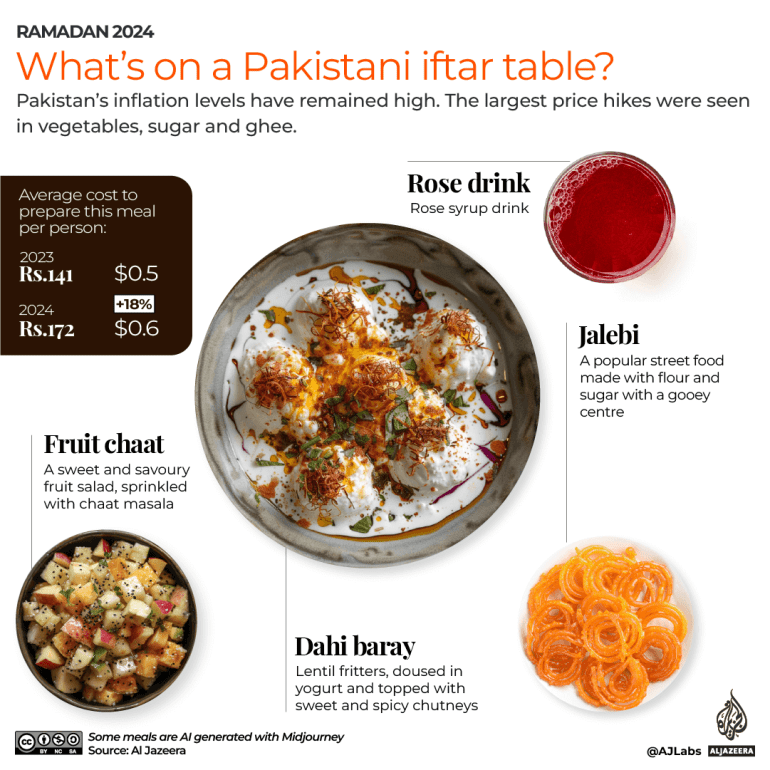
Palestine
One of the most widely eaten dishes across Palestine and the Levant region is maklouba, which translates from Arabic to “upside-down”. It is a flavourful rice dish with layers of sliced eggplants, meat and other vegetables cooked together in a pot, then flipped upside-down onto a serving platter before eating.
Complementing the maklouba is dagga - a traditional spicy tomato and cucumber salad covered in olive oil.
For dessert, a great Ramadan choice is katayif, a type of semi-circular stuffed pancake often filled with walnuts or cheese and then dipped in syrup.
Tamir hindi is a popular drink made with tamarind and sugar.
Totalling up the grocery cost, Al Jazeera calculated that it costs about 31.5 shekels ($9) to prepare a serving of this iftar meal in the occupied West Bank this Ramadan. The same meal cost 28.5 shekels ($8) in 2023, an 11 percent increase.
Olive oil had the most significant price increase, nearly doubling from 30 shekels ($8.2) per litre in 2023 to 55 shekels ($15) this year. The price of meat also saw a 10 percent increase.
Observing Ramadan in Gaza amid Israel’s continuing assault has been a huge challenge for many Palestinians. Preparing a meal is a luxury that many can’t afford. According to people on the ground, a single egg now costs 6 shekels ($1.64).
Despite this, families are trying to keep their spirits and traditions alive by preparing whatever meals they can. Al Jazeera spoke to some of these displaced families who are now living in tents in Rafah.
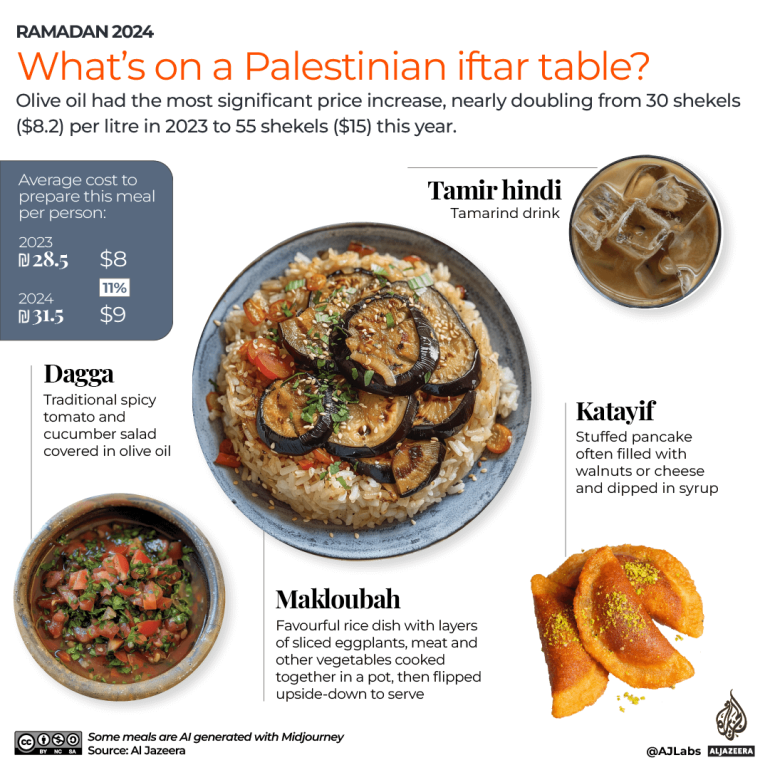
South Africa
The Rainbow Nation has a variety of racial and ethnic groups. Preparing a traditional meal means bringing together various foods. For the main course, South Africans can enjoy a classic combo of pap en vleis, also known as shisa nyama - a maize meal porridge eaten with barbecued meat.
Accompanying this is chakalaka, a spicy vegetable relish made with onions, tomatoes, carrots, beans and spices. For dessert, koeksisters - braided deep-fried dough drenched in syrup - provide a crunchy treat.
To round off the meal, a "Stoney" - carbonated ginger beer - offers a refreshing end to the iftar.
Like many countries, South Africa is battling rising inflation. Al Jazeera calculated that it costs about 77 rand ($4.0) to prepare a serving of the iftar meal above. In 2023 the same meal cost 68 rand ($3.6), about a 13 percent increase.
The biggest price increases came from the price of store-bought chakalaka and pantry items such as cake flour and sugar.
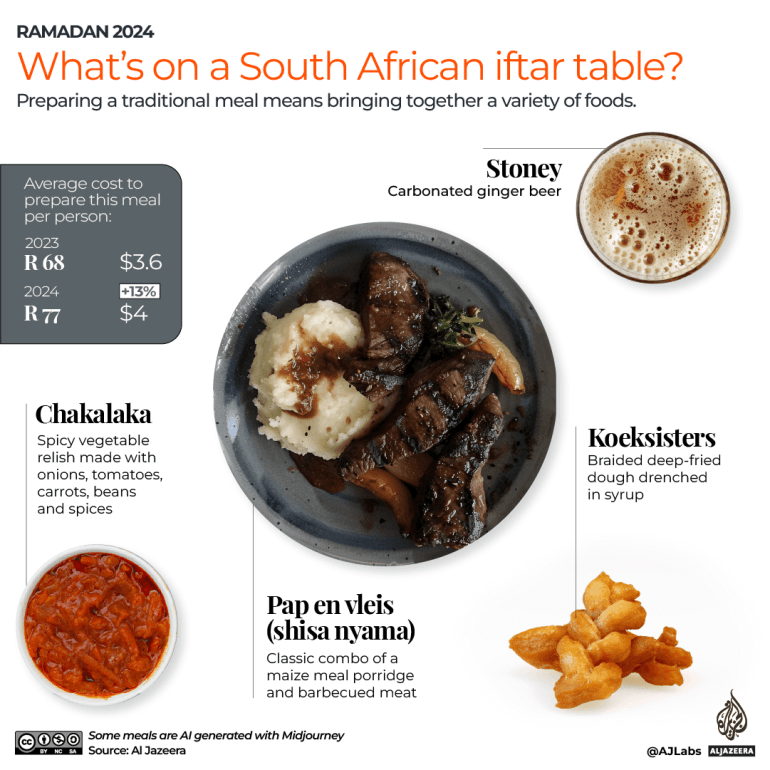
Turkey
As the sun sets in Turkey, many families will feast on dolma - stuffed vegetables with a mixture of rice, meat and herbs.
On the side, is a bowl of cacik, a creamy yoghurt and cucumber dip. For dessert, one of the many choices might be a bowl of muhallebi, a milk pudding flavoured with cinnamon and nuts.
And to support digestion, salgam, a fermented turnip beverage is a good choice.
Turkey has also seen soaring levels of inflation. Setting out the table for iftar, Al Jazeera calculated that a serving of this meal costs about 60.5 lira ($1.9), compared with about 50.6 lira ($1.6) a year ago - an increase of about 20 percent.
Among the biggest price hikes came in the form of dairy products including milk and yoghurt.
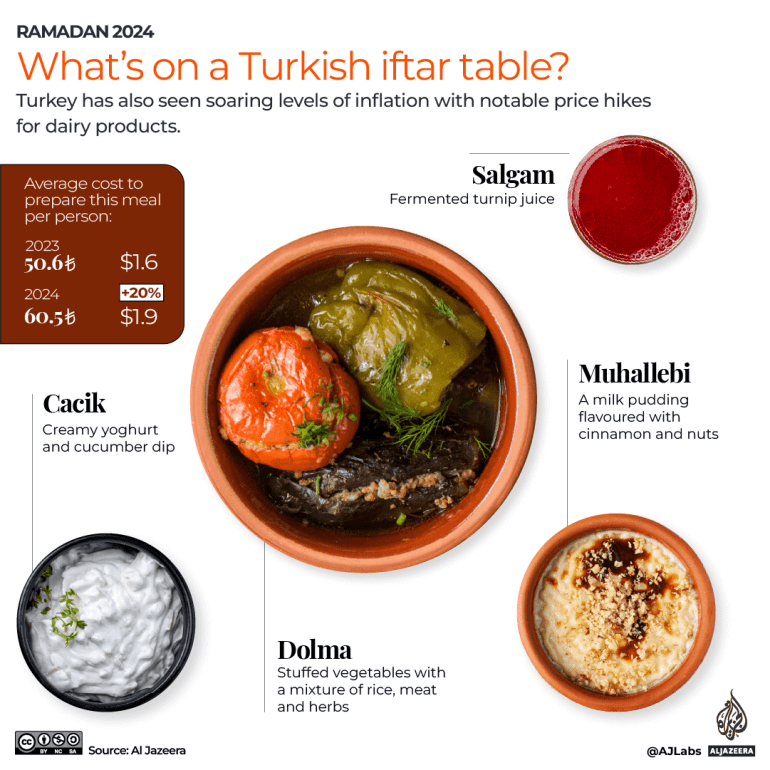
United Kingdom
There are roughly four million Muslims in the UK. Like many other non-Muslim majority countries, the choice of iftar meals depends largely on a household’s ethnic background. A hearty British seafood iftar could comprise a slice of salmon fillet served with a side of greens and a bowl of rice.
Served after the main course could be a bowl of fruit yoghurt.
Packed with antioxidants, and aiding digestion could be a hot cup of green tea.
For this year’s iftar, Al Jazeera calculated that it costs roughly 2.2 pounds ($2.7) for a single serving of the meal above. That’s a marginal increase of about 4 percent from the previous year of 2.1 pounds ($2.6).
In 2022, the UK experienced seven months of double-digit inflation peaking at 11.1 percent in October. The rate has since settled at about 4 percent during the first few months of 2024.
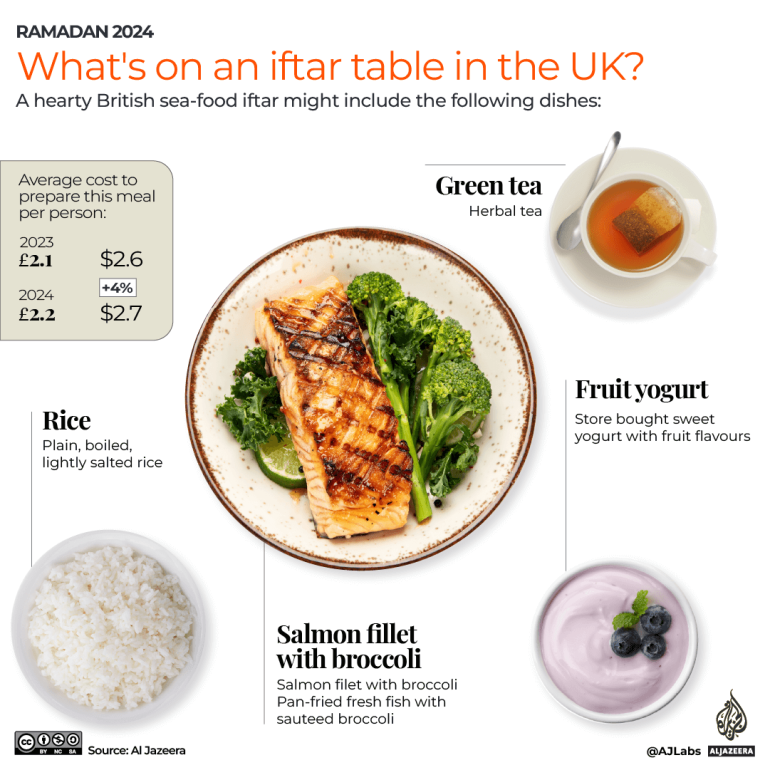
United States
The United States has a diverse Muslim community with about three to four million members - or about one percent of the population. A popular main dish enjoyed across many American households is the culinary classic oven-roasted chicken infused with herbs and spices.
Complementing the roast, one might find the traditional Middle Eastern green salad topped with crispy pieces of toasted bread known as fattoush.
For dessert, one can’t go wrong with a piece of kunafa, a sweet and cheesy dessert topped with nuts.
To round off the evening, one can reach for a flavoured milk of your choice.
To prepare this year’s meal, Al Jazeera estimated costs are roughly $7.1 per serving this Ramadan. Last year the same meal cost about $6.7, an increase of about 5 percent.
For the most part, the prices of the ingredients needed to prepare this meal have held firm with slight increases in the price of poultry and dairy.
